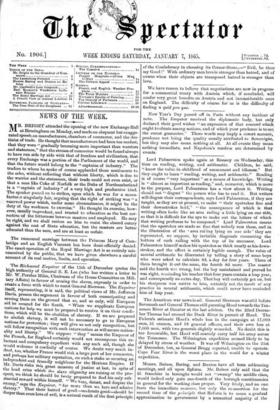Lord Palmerston spoke again at Romsey on Wednesday, this- time
on reading, writing, and arithmetic. Children, he said, " know the value in childhood of amusement and idleness." But they ought to learn " reading, writing, and arithmetic." Reading is of course " very important " as a means of knowledge. Writing is t, almost as important as reading," and, moreover, which is more to the purpose, Lord Palmerston has a view about it. Writing should not " disgust " the person who has to read it. But writers will disgust their correspondents, says Lord .Palmerton, if they are taught, as they are at present, to make " their upstrokes fine and their downstrokes bold," " the consequence of which is that writing often looks like an area railing a little lying on one side, so that it is difficult for the eye to make out the letters of which that writing professes to be composed." Lord Palmerston means that the upstrokes are made so fine that nobody sees them, and in the illustration of the I area railing lying on one side' they are represented, we suppose, by invisible diagonals connecting the bottom of each railing with the top of its successor. Lord Palmerston himself makes his upstrokes as thick nearly as his down- strokes, and the effect is certainly legible enough. The value of mental arithmetic he illustrated by telling a story of some boys who were asked to calculate 8d. a day for four years. Three of them brought it out the same, the fourth 8d. more. The master said the fourth was wrong, but the boy maintained and proved he was right, reminding his teacher that four years contain a leap year, and consequently an extra day. That boy will certainly get on, but his sharpness was native to him, certainly not the result of any, practice in mental arithmetic, which could never have reminded him of leap year.




































 Previous page
Previous page